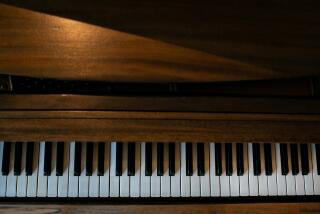Don Grusin Synthesizes a Career on the Keyboard
- Share via
Don Grusin has a problem. Working on a new film project, he’s seated in the midst of a panoply of high-tech musical instruments, pushing a computer button here, a keyboard key there.
Nothing happens. “Hmm,” frowns keyboardist-composer-GRP recording artist Grusin. “I must have dumped the drums to the wrong track.”
Grusin is one of the new breed of musicians who likes to work alone, accompanied only by state-of-the-art synthesizers, samplers, drum machines and computers.
He pushes more buttons. Lights blink, video monitors shift displays and an infectiously funky rhythm begins to roar out of a bank of speakers.
“Ah, there it is,” he says. Another button produces a steaming bass line to join the drums. “All I need now is the melody.”
As a successful songwriter, Grusin has written more than 120 pieces for performers such as Patti Austin, Lee Ritenour and Ernie Watts, and has produced albums for David Benoit (“Urban Daydreams”) and Watts (“Sanctuary”). As a player, he is best known for his work with Ritenour’s “Friendship” Band and with his groups led by his brother Dave, the Academy Award-winning composer for “The Milagro Beanfield War.”
Grusin moves to one of the keyboards. He begins to play a synthesizer line that soars above the other tracks. The music is hot and alive, but the visual effect is almost eerie.
Poised over his synthesizer keyboard, eyes half closed, pumping out his melody, Grusin is the very image of a musician interacting with other musicians. Yet he is alone in a rustic, wood and glass-trimmed studio in the Santa Monica Mountains. Outside, a cool winter wind rustles through scraggly oak and pepper trees. Inside, Grusin makes music with electronic phantoms of his own creation.
“It’s the way I like to work,” says Grusin, a slender, dark-haired man in his late 40s whose bemused expression reveals a crooked smile topped by dark, wide Paul McCartney-like eyes.
“Most of my new GRP album, ‘Raven’--my first solo album--was done this way,” he says. “I played the bass, drums, percussion, keyboards and guitar parts with synthesizers, then took the tracks into the studio and had people add solo stuff and reinforce the parts. Then the whole thing was topped off with my piano solos.”
It’s an unusual, if not completely unknown, way to produce a jazz recording. But, for Grusin, it seems to work. “Raven’s” tracks range from the updated bop sounds of “Hip Hop Be-Bop” and the Gil Evans-ish “Oracle” to the fusion rhythms of “Graffiti-Bird” and “Catwalk.”
Grusin will make a rare appearance with a live group Thursday and Friday at Le Cafe. Although he has been performing for the last two decades with such luminaries as Quincy Jones, Ritenour, Watts and brother Dave Grusin, he has not led his own band in public for at least 15 years.
“I like to play live,” he says, “I like the feeling it gives me.”
Then, suddenly shifting gears in a way that characterizes much of his music as well as his career: “But the truth is that I don’t really like the limelight that much. I’m sort of interested in the feeling I get when I’m in the limelight, but I don’t really want to pursue it. It’s not going to be my Super Bowl.”
Grusin’s position in the limelight, in fact, has been overshadowed, for much of his life, by the work of his seven-year-older brother, Dave (who was nominated last week for another Academy Award for his score for “The Fabulous Baker Boys”).
“It’s not a problem now,” Grusin says, “but there was a time. . . . I can remember when I was a kid, I didn’t want to be a piano player--didn’t even want to be a musician--and it was primarily because of Dave. He’d come home from college when I was 14, driving a car and having a girlfriend--actually doing all the stuff that was driving my hormones crazy.
“But now we’re really tight. Our favorite thing is to go fly fishing in Montana. I suppose we only get to spend four or five weeks a year together, but I guess we’re each other’s closest friend.”
Grusin looks around his comfortable studio environment, filled with keyboards, computers, amplifiers and speakers. It’s clearly the place he prefers to be now.
“I don’t think I decided to have a career of any kind until I was 35,” he says. “I played a lot of music, taught some, studied economics--which still interests me--but I didn’t really settle into music until fairly late.
“Now, I feel as though I’m a musician--that’s what I do. But that’s not to say I wouldn’t mind becoming a marine biologist. Because I would. And I may do it someday. I may just pick up, leave all this equipment behind and go do that.”
More to Read
The biggest entertainment stories
Get our big stories about Hollywood, film, television, music, arts, culture and more right in your inbox as soon as they publish.
You may occasionally receive promotional content from the Los Angeles Times.










